THE LIVING TAO : TIMELESS WISDOM FOR THE MODERN WORLD
This is a podcast dedicated to exploring the profound, yet elusive True Tao (真道). Acknowledging that the essence of Tao is beyond traditional discourse and expression, this series seeks to demystify Taoist principles and adapt them for contemporary listeners. Each episode offers a blend of ancient wisdom and modern insights, providing practical guidance for navigating the complexities of today’s world. Whether you’re a seasoned practitioner or new to the path, join us in discovering how the timeless wisdom of Tao can be lived out in the here and now.
Episodes
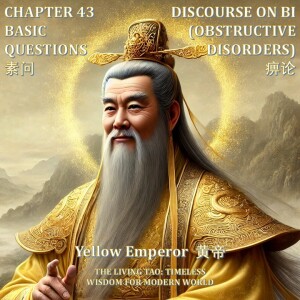
Monday Nov 25, 2024
Monday Nov 25, 2024
This Chatpter is a dialogue from the Yellow Emperor’s Classic of Internal Medicine, exploring the nature and treatment of bi, a condition encompassing various obstructive disorders. Bi is explained as arising from imbalances of wind, cold, and dampness, affecting different parts of the body depending on the season and the predominant pathogenic factor. The discussion details the symptoms and organ involvement of bi, its progression, and the role of acupuncture in its treatment. Finally, it examines the relationship between bi and the body's energy systems, the nutritive and defensive qi.
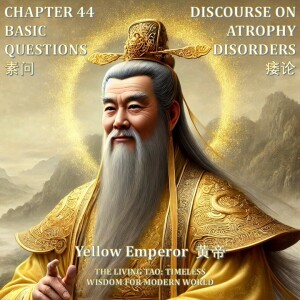
Monday Nov 25, 2024
Monday Nov 25, 2024
This Chapter is a dialogue from the Yellow Emperor’s Classic of Internal Medicine, exploring the causes and treatments of wei (atrophy disorders). Qi Bo, a renowned physician, explains how imbalances in the five organs—lungs, heart, liver, spleen, and kidneys—lead to different types of atrophy, manifesting in specific symptoms and physical signs. He further details how these imbalances arise from various factors, including emotional distress, environmental exposure, and excessive activity. Finally, Qi Bo emphasizes the importance of the Yangming channel in treating wei, advocating for a holistic approach that balances the body's energy flow and strengthens specific acupuncture points.
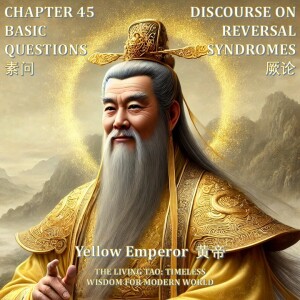
Monday Nov 25, 2024
Monday Nov 25, 2024
This Chapter is a dialogue from the Yellow Emperor's Classic of Internal Medicine, exploring the concept of jue, or reversal syndromes. The discussion centers on the differentiation between cold and heat reversals, their causes stemming from imbalances of yin and yang qi, and their manifestations in various meridians of the body. Specific symptoms and treatments are detailed for each meridian, highlighting the importance of diagnosing the underlying imbalance for effective treatment. The text emphasizes the internal origin of these disorders, contrasting them with externally caused illnesses. Finally, it underscores the potentially severe consequences of untreated imbalances, particularly in the case of simultaneous yin meridian reversals.
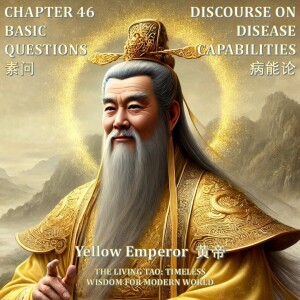
Monday Nov 25, 2024
Monday Nov 25, 2024
This Chapter is a dialogue from the Yellow Emperor’s Classic of Internal Medicine, a foundational text of Traditional Chinese Medicine. The dialogue explores various illnesses, their diagnoses based on pulse analysis and other symptoms, and their treatments using acupuncture, herbal remedies, and dietary adjustments. The discussion also covers fundamental diagnostic principles found within different sections of the Classic, emphasizing the importance of understanding the relationship between illness, the four seasons, and the body's internal energies. The overall focus is on the practical application of TCM theory to clinical practice.
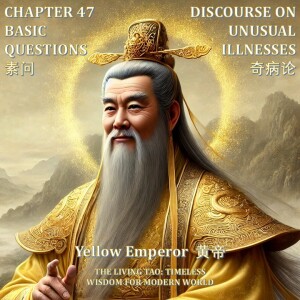
Monday Nov 25, 2024
Monday Nov 25, 2024
The Yellow Emperor's Classic of Internal Medicine, specifically Chapter 47, presents a dialogue between the Yellow Emperor and Qi Bo, exploring various unusual illnesses. The text details several conditions, their symptoms, causes (often attributed to imbalances of qi and the five elements), and prognoses. Qi Bo, a renowned physician, offers explanations based on traditional Chinese medicine principles, including the importance of channels, organs, and the interplay between excess and deficiency. The discussion covers a range of ailments, from pregnancy-related muteness to chronic headaches and digestive issues, providing insights into ancient diagnostic and therapeutic approaches. The Emperor's questions guide the discussion, clarifying the nature of each disease and its treatment (or lack thereof).
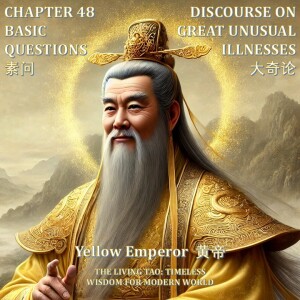
Monday Nov 25, 2024
Monday Nov 25, 2024
The Yellow Emperor's Classic of Internal Medicine, specifically Chapter 48, details various illnesses and their corresponding pulse diagnoses. The text describes symptoms associated with organ imbalances, such as liver, kidney, and lung obstructions, and connects pulse characteristics to specific conditions and prognoses. Different pulse qualities, like tension, depth, and speed, are linked to specific illnesses and outcomes, ranging from minor disorders to fatal conditions. The prognosis for each condition is often tied to natural phenomena, such as the falling of leaves or the appearance of frost. Ultimately, the chapter provides a system of diagnosis and prediction based on pulse analysis.
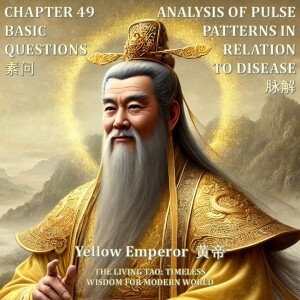
Monday Nov 25, 2024
Monday Nov 25, 2024
The Yellow Emperor's Classic of Internal Medicine, specifically Chapter 49, explores the relationship between pulse patterns and disease, as explained by Qi Bo to the Yellow Emperor. The text analyzes how imbalances in the six meridian energies (Taiyang, Shaoyang, Yangming, Taiyin, Shaoyin, and Jueyin) during different seasons manifest as specific symptoms. Each meridian's association with a particular time of year and its corresponding energy influences the types of illnesses experienced. Qi Bo details the symptoms associated with each meridian's energetic imbalance, offering insights into Traditional Chinese Medicine diagnostic practices. The dialogue format highlights the question-and-answer approach to understanding the underlying principles of this ancient medical text.
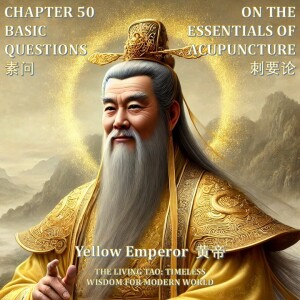
Monday Nov 25, 2024
Monday Nov 25, 2024
This Chapter is an excerpt from the Yellow Emperor's Classic of Internal Medicine, specifically Chapter 50, detailing the principles of acupuncture. The dialogue between the Yellow Emperor and Qi Bo explains the importance of precise needle depth to avoid harming internal organs. Different depths correspond to different layers of the body and related organs, improper technique causing illness. The text emphasizes the connection between acupuncture points, internal organs, and seasonal illnesses. Ultimately, it advocates for a nuanced approach to acupuncture based on precise anatomical knowledge.
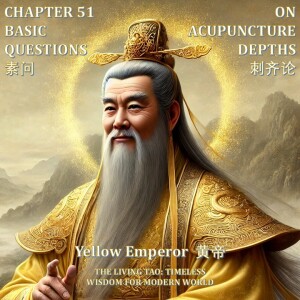
Monday Nov 25, 2024
Monday Nov 25, 2024
The Yellow Emperor's Classic of Internal Medicine, specifically Chapter 51, details the proper depth of acupuncture needles. The text presents a dialogue between the Yellow Emperor and Qi Bo, exploring the precise placement of needles to target specific tissues (bone, tendon, muscle, vessel, skin) while avoiding damage to adjacent layers. Qi Bo emphasizes the importance of needle withdrawal before reaching the intended target layer to prevent injury, highlighting a principle of controlled and precise acupuncture technique. This emphasizes the need for careful and precise technique in acupuncture.
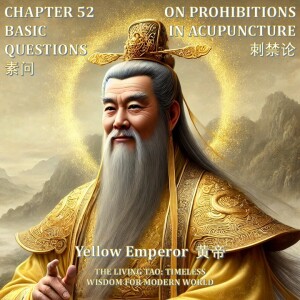
Monday Nov 25, 2024
Monday Nov 25, 2024
The Yellow Emperor's Classic of Internal Medicine, specifically Chapter 52, details the dangers of improper acupuncture techniques. Qi Bo, responding to the Yellow Emperor's inquiry, outlines numerous vital areas where needling is prohibited, specifying the potentially fatal consequences of such actions. He lists various organs and areas, explaining the resulting harm from incorrect needle placement, including death, blindness, paralysis, and other debilitating conditions. The text emphasizes the critical importance of anatomical knowledge and careful technique in acupuncture to avoid causing harm to the patient. Finally, it advises against needling patients under specific circumstances, such as intoxication, anger, or extreme states of fatigue or hunger.

The Living Tao
Welcome to The Living Tao: Timeless Wisdom for the Modern World—your guide to living a life of balance, wisdom, and inner peace. Inspired by the profound teachings of ancient masters, this podcast explores the enduring relevance of these timeless insights in today’s fast-paced world.
Taoist teachings emphasize living in harmony with the natural flow of life—the Tao, or "the Way." This philosophy invites us to embrace simplicity, cultivate humility, and find peace by aligning ourselves with the rhythms of the universe. At its heart, Taoism encourages us to let go of resistance, shed the distractions of ego, and discover the profound serenity that comes from living authentically and in tune with our true nature.
The Tao Te Ching, attributed to Laozi, is one of the most influential texts in Taoism and serves as a cornerstone of our discussions. Its poetic verses guide us to reflect on themes like balance, self-awareness, and effortless action, or wu wei. These teachings are not bound by time or culture—they resonate just as powerfully today, offering insights that help us navigate the complexities of modern life with grace and equanimity.
Each episode of The Living Tao will uncover practical wisdom rooted in these ancient teachings, presenting it in ways that are both accessible and transformative. Whether it's understanding the art of stillness in a world of constant movement, finding clarity amid chaos, or exploring the paradoxes of strength through softness, you’ll discover tools and perspectives to enrich your life and deepen your connection to the world around you.
Whether you're a seasoned practitioner familiar with the Taoist path or a newcomer drawn to its gentle yet profound philosophy, this podcast offers something for everyone. Together, we'll explore how these age-old principles can help us embrace change, cultivate mindfulness, and find a sense of purpose and inner peace in the face of life's challenges.
Join us on this journey of self-discovery, as we bring the wisdom of the Tao into the present moment. Let the timeless truths of this ancient tradition inspire and empower you to live a more harmonious and enlightened life. Tune in, reflect, and allow the teachings of The Living Tao to guide you back to the essence of who you are.








